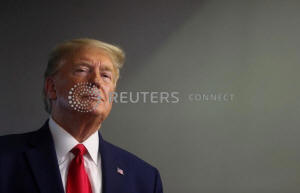Exclusive: Trump pressed to halt
federal pension investments in China's ZTE, Hikvision
 Send a link to a friend
Send a link to a friend
 [April 21, 2020]
By Alexandra Alper [April 21, 2020]
By Alexandra Alper
WASHINGTON (Reuters) - Lawmakers and
former officials are making a last ditch push to persuade the Trump
administration to halt plans to invest billions of federal employee
retirement dollars in Chinese companies that Washington suspects of
human rights abuses or threatening U.S. security, according to
sources and documents seen by Reuters.
The campaign, which includes letters and calls from Republicans and
a sharply worded memo shared with White House Chief of Staff Mark
Meadows, coincides with heightened U.S.-China tensions over the
origins of the coronavirus pandemic.
At issue is whether administrators of the Thrift Savings Plan (TSP),
a retirement savings fund similar to a 401(k) for federal employees
and members of the military, should allow its $50 billion
international fund to track an index that includes some China-based
stocks of companies under scrutiny in Washington.

Among the Chinese companies in the index that have drawn the ire of
some in Washington who see China as America's biggest economic and
geopolitical threat is surveillance firm Hangzhou Hikvision Digital
Technology, which was placed on a trade blacklist last year because
its technology is used in detention camps for China's Uigher Muslim
minorities.
The fund would also invest in telecoms equipment company ZTE , which
was penalized by the U.S. government for violating U.S. sanctions.
For China hardliners, the matter has taken on greater urgency
because administrators have begun opening custodial accounts abroad
to make investments due in the second half of 2020.
"Are we very soon going to witness ... federal employees ... being,
in effect, unwittingly compelled to fund with their retirement
dollars a number of Beijing's most egregious corporate national
security and human rights abusers?" asked Roger Robinson, a former
White House official in the Ronald Reagan administration who has
tracked the issue closely.
The Federal Retirement Thrift Investment Board (FRTIB) which
administers the TSP, said all of its peers are making similar
investments and that it "would be a lagging outlier amongst
retirement savings plans" if it doesn't expand its investments,
according to spokeswoman Kim Weaver.
The White House and the Department of Labor, which oversees the
board, did not respond to requests for comment.
Trillions of dollars worldwide passively track benchmarks which are
compiled by third party index providers based on a range of
criteria, including companies' market capitalization, as opposed to
fund managers picking the stocks themselves.
When a consultant cited higher returns were possible, the FRTIB
decided in 2017 to switch the benchmark for its international stock
fund in 2020 to the MSCI All Country World ex-U.S.A. Investable
Market Index, which represents 99% of world equities, including
Canada, China and other emerging markets.
[to top of second column] |

President Donald Trump participates in the daily coronavirus task
force briefing at the White House in Washington, U.S., April 20,
2020. REUTERS/Jonathan Ernst

The plan hit road bumps last year when Republican Senator Marco
Rubio and Jean Shaheen, a Senate Democrat, proposed legislation that
would prevent investments in China, flagging insufficient levels of
accounting and financial disclosure at Chinese firms, in addition to
national security and human rights issues.
But the legislation languished, spurring a final campaign to prevent
the change.
A person familiar with the matter said a handful of former
government officials provided to former congressman Meadows a memo
dated March 7, the day after U.S. President Donald Trump tapped him
to be White House Chief of Staff.
The memo argued that if Trump did not act, by replacing FRTIB board
members or through an executive order, his critics would claim Trump
took no action to avoid "federal employees being compelled to invest
in Chinese and Russian companies that have undisclosed material
risks due to their roles in threatening our national security and
abusing human rights."
Meadows, who had sponsored companion legislation to Rubio's bill in
the House of Representatives, did not respond to a request for
comment through the White House.
Top lawmakers have raised the issue directly with the
administration, according to people familiar with the matter. Rubio
discussed the issue with Trump in the last few months, a
congressional aide said.
Republican congressmen Mike Gallagher and Jim Banks have addressed
letters to Department of Labor Secretary Eugene Scalia, two aides
said.

In one dated April 6, Banks called on Scalia to explain how the
agency plans to inform investors of the risks of owning shares in
companies that don't comply with U.S. financial disclosure
requirements and the implications of investing in firms that are
under U.S. sanctions.
"I urge you to do everything in your power to reverse the TSP
Board's decision," Banks wrote.
(Reporting by Alexandra Alper; Additional Reporting by Michelle
Price; Editing by Chris Sanders and Grant McCool)
[© 2020 Thomson Reuters. All rights
reserved.] Copyright 2020 Reuters. All rights reserved. This material may not be published,
broadcast, rewritten or redistributed.
Thompson Reuters is solely responsible for this content. |